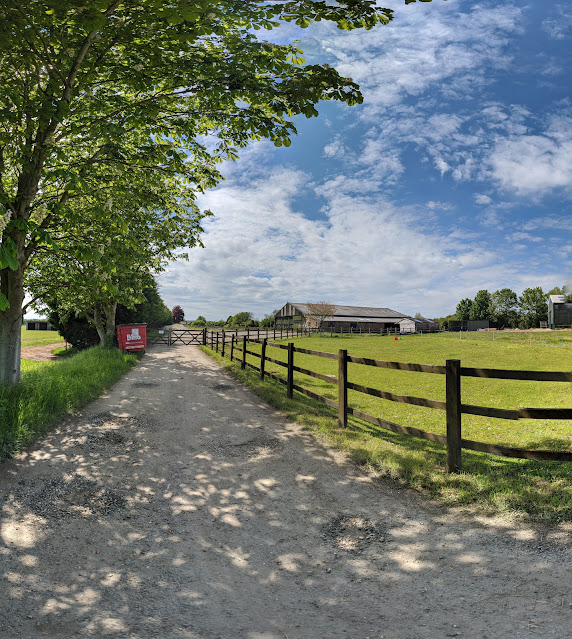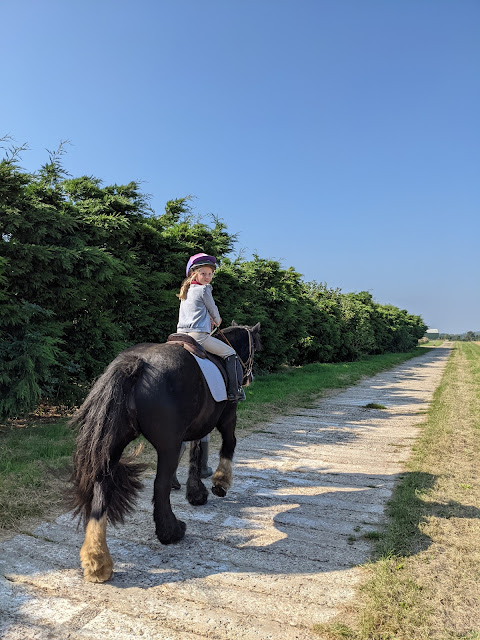Ten things I've learned from my first ten years of RDA involvement
 |
| Ten years of RDA... I wonder how many times I've been up and down this drive! |
It's not the right time to the specific day, but the tenth day of the tenth month seemed a fitting (and even auspicious) day to publish a post marking my tenth "RDA birthday". I had just turned 18 when I started volunteering with my group, and ten years later - and older - I'm if anything more hooked than I imagined back then. For just over two years, it's also been a lot of fun to share some of the things I've learned and experienced with the people who read my blog (this will be you - yes you, hello! - if you're reading this), and I thought I'd mark my personal tenth anniversary with ten of my snappiest and most lasting lessons from the last decade.
1. Ten years of experience isn't necessarily "experienced" (yet)
I was considered experienced in my day job about three years in, but often joke that I'll have to be in RDA for ten times as long before I can even suggest the same thing there. If I'm honest, there's definitely an argument for length of service not automatically equalling adaptability, efficacy, skill or passion - although it is incredibly important to celebrate those who have given much (if not most) of their lives to RDA, and to learn from our most experienced coaches where we can. In the last three or four years, I genuinely feel that the most important way I've become more experienced as an RDA coach is the way I've accepted the fact that I'm on a constant learning curve. Am I experienced right now? Who knows! I do know I am gaining experience all the time, which is probably more important.
2. Horses can be the best, but also most frustrating part of RDA
Sophie Christiansen told me that her goal-orientated personality could be frustratingly incompatible with keeping, loving, and working with horses, so I've decided it's OK to admit that it frustrates me from time to time that horses are both wonderful and utterly essential to RDA, but also unpredictable, sensitive (in all sorts of ways!), expensive, and just not at all sensitive to any or sometimes all of my best laid plans. "Who decided that doing this with horses would be a good idea?" I have said to myself more than once when tramping across a muddy field to try and retrieve our wayward Welsh pony who has been resisting capture for twenty minutes. I haven't cracked the code of being zen about the horse factored into your plans (plans like going to a big competition) coming in lame 48 hours before - maybe that's a twenty year thing. It's definitely a can't live with/can't live without situation. But with pretty much all of the emphasis on the "can't live without".
3. It's true that "volunteers don't always have the time, but they have the heart"
"How do you find the time to go to RDA every weekend?" I suppose I know it's time well spent. Other than that, it's anyone's guess. It's important to know where your personal limits are, and I'm not suggesting regularly bunking off work or school to go to RDA, but I know a lot of volunteers who are otherwise very busy people who gave it a chance and found they could keep making it work. It's the sentiment of a thousand cheesy Facebook posts and tea towels, but it's true that volunteers aren't volunteers because they have stacks of free time: they just have the heart to use what they do have.
4. RDA coaching is as close as you're going to get to being a fairy godmother
I am not here to convince anyone that I am in fact a magical being, but I can pretty easily convince you that RDA deals with real life magic. As a coach, I have the privilege of coordinating and directing some of that magic. It can be really small things: realising a rider would really like to ride a particular pony and quietly making it happen, or engineering a game or exercise just a tiny bit so that another rider gets to feel more happy and confident than they have felt all week. Being able to invite riders back for the first time after Covid (and even reuniting one with her favourite pony on the morning of her birthday just after the first lockdown) was serious magic, and I will never forget the email I received from a parent after a successful weekend at Nationals saying "thank you for making my daughter's dreams come true". Nothing else in my life brings me this close to being a fairy godmother.
5. You can have too much of a good thing
How excellent it is that the world is becoming more appreciative of the importance of mental health and the ways we can all maintain ours: I have and will continue to champion RDA volunteering as a way of doing this. That said, I am grateful for the realisation that you can burn yourself out just as readily from doing too much good stuff as you can from doing or experiencing too much bad stuff. It is possible to experience burnout from overcommitting to RDA, especially if you coach and/or take on another leadership role, but I think it can be hard for people to accept or admit to when they know they're doing something good. Clarity and honesty about it are important, because they mean we're more likely to keep ourselves healthy and motivated for the great stuff we're doing. Recruiting more people to the cause won't do any harm either...
 |
| Laura cantering on Ernie, a dun Connemara gelding, in the outdoor arena on a bright sunny day |
6. RDA has side effects
We're past the season of discussing vaccination side effects (I think), so let's talk about good side effects, which can be found in huge numbers in RDA. I've lost count of the people I've met in the last ten years who have come to RDA or one reason - often something straightforward like wanting to do something new, spend more time with horses, or complete volunteering hours for an award scheme - and ended up not only staying but finding the side effects of being involved with their local group send ripples right across other parts of their lives. People will find that RDA can boost a job or university application; or that it has introduced them to friends who go beyond the stable yard; or that it improves their health (physical or otherwise) and therefore ability to access other opportunities. One of my longest standing volunteers started with us as a teenager, and went on to pursue work in special education because of her experiences. The side effects may even include exciting opportunities: less than a year into my experiences, I was able to go to the London Paralympics with my RDA group. Side effects will vary according to individuals, but you are very likely to get good ones if you're involved long enough.
7. There's a difference between "doing something nice" and "doing something meaningful"
When I first started RDA, I definitely had the entry-level outlook of "isn't this just so nice". That isn't incorrect, but an important lesson for anyone in and out of the organisation is to understand that RDA has much more potential than "nice". The organisation's impact (a measure which will play a large part in its future, given the nature of modern grants and their focus on it) is grown by being ambitious, dynamic, innovative and sensitive. We could look no further than offering pony rides: there would be more therapeutic benefit than not offering them at all. If there's scope for more, though? I know where I'm headed...
8. RDA participants will all be very different, but working out how best to meet their needs doesn't need to be a big mystery
It's not unusual to find RDA volunteers joining groups with no significant experience of either horses or helping disabled people, and if people are coming in with experience of just one, it's more likely to be horses. As such, it's also common for new volunteers and/or coaches to feel a pinch of trepidation about how to get things right for their group's participants. What's the best way to communicate? How much help will they need? What if the answers are totally different for everyone? (Spoiler for this one: they almost certainly will be.) Worrying about doing the right thing isn't bad: it shows we care about what we're trying to do. It's important to remember, however, that if we pay enough attention, RDA participants will show us (if not tell us) what the best way is for them. We're all people, at the end of the day, and the right answers might be more straightforward than you think.
9. RDA isn't perfect...
I love RDA, but the longer I'm in it the more opinions I have about ways I would like it to improve and evolve. I've already experienced changes I like within the organisation, but I'd like to see more and in some cases I'd like them to happen faster, particularly for the generation of coaches I am part of who are looking at long futures with RDA, but who are increasingly having to juggle those futures with additional pressures and commitments. I don't pick holes because I find it fun: I genuinely do think that we should be making it more accessible for new coaches to train (and existing coaches to develop in a way that suits them); that our competition system needs an overhaul; that we need greater support in the purchase and training of new horses to continue our work. RDA has been going for 52 years: it makes sense that some bits need preserving and others need updating, and it also makes sense to be invested in making it better for the near and distant future if I'm planning to be around for that myself.
10. ...you aren't perfect either, but you're better for being part of it
Nobody's perfect and nobody's ever going to stop needing to learn things - even RDA people. I think it might have made me feel every emotion going over the past ten years, but the ones which loom largest are enjoyment, fulfilment, ambition, pride, excitement, and joy. I am a better person for being part of it all.
 |
| Looking back: Matilda riding Maple (plus a leader, not especially visible!) turning to look over her shoulder when out on a hack on a sunny day |



Comments
Post a Comment